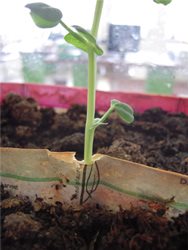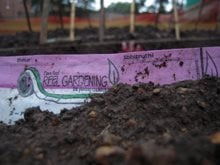"It began with my father asking me to plant a vegetable garden during my school holidays," says 23 year-old architectural student Claire Reid. "I think he was trying to teach me about business, by suggesting I grow the veggies and he would buy my crops from me." She was then 16 and the first thing that struck Reid was the cost of starting the garden.
"I was shocked at the cost of the seeds for just four different crops," she says. "With the compost and the fertiliser, the price seemed astronomical for what would be a front-door sized garden. On top of that, most of the seeds go to waste. There are too many in one packet and they expire after a year."
With tape measure in hand and tomato seeds in her palm, Reid attempted to follow the instructions on the seed package. Finding things difficult, she asked her family domestic worker Meggie to assist. "Meggie doesn't like gardening at all," says Reid. "She was an unwilling participant - and then I found out why."
It occurred to Reid that, while she had been tutored in both mathematics and English, Meggie had not. "The way the instructions are written on the pack makes it unfeasible for the people who most need the vegetable gardens to actually grow them. On top of that, the outlay is just not worth the yield."
First idea
Reid felt there must be some way to overcome the problem. Then an idea that will change many lives came to her: What if there was a strip of seeds that were perfectly spaced, which could then be planted?
Knowing that newspaper is biodegradable, Reid cut a strip and stuck the seeds to it with a mixture of flour and fertiliser. She planted the strip, knowing that not only would the plants be correctly spaced apart but also the birds wouldn't be able to devour them before they had a chance to germinate.
First award
"I was in Grade 10 when a teacher said I'd get extra credits for entering the Eskom Young Scientists Expo. I took my invention along and won a gold medal at nationals. I was thrilled and even happier when it caught the attention of the Department of Water Affairs and Forestry, who asked if I had conducted any tests to see how much water I could save using this method."
The Department nominated Reid's invention for the South African Junior Water Prize, because it reduces water wastage by up to 80%, which she won.
Swedish prize
Then she represented South Africa at the Stockholm Junior Water Prize, hosted by the Swedish royal family, where Reel Gardening came first out of 24 countries. "I was so intimidated, being the youngest of all the competitors. We won the international competition and things have just grown from there,” she says.
The judges in Stockholm saw that this invention had the ability to solve both food and water shortages. According to Reid, “around 60% of our water goes into agriculture, so if we are able to save 80% of that 60%, it's a big deal. It also enables people to feed themselves."
Going commercial
The challenge now was to get large volumes of the product into the market, which she realised would be a mammoth task to produce the seeds commercially. She took the problem to Labelpak, who came up with a practical solution.
The position of each seed is indicated on the strip of biodegradable paper, so the gardener can take just a small amount of water and pour it on the appropriate area. The paper absorbs the water thus keeping the moisture right at the seed for longer.
The adhesive and face paper, securing the seed into position while enabling and affecting the seal of the strip, had to be biodegradable and bio-inert so as not to impede germination. Exhaustive trials were implemented before the correct paper and adhesive combination were selected.
Labelpak now produce “seed strips”, which have a continuous length of self-adhesive paper with the backing slit down the middle to allow for easy removal. The face paper is a biodegradable substrate with a water-based adhesive.
The face paper is printed with the description of the seed enclosed, such as carrots or tomatoes. Also included are planting and watering instructions.
Production of base gardens
Reel Gardening had a semi-automatic machine built, which strips one-half of the backing away, and drops the seeds onto the exposed adhesive, at the required spacing. The other half of the backing is then stripped away, and the face paper is folded in half, and adheres to itself. This leaves the seeds encased in fully identified, biodegradable paper, ready for distribution.
From her venue in Johannesburg and a few select retailers, Reel Gardening now offers "seeds by the metre”, which means gardeners can purchase a metre of beans or two metres of spinach, depending on the size of their vegetable patch and the yield they need. There is also a range of herbs on offer now.
"You're only paying for what you are going to use and the fertiliser is part of the strip. There are also seven of our official languages on every strip, as well as colour coding and drawings to indicate how to plant the strip." With vegetable, salad and soup garden starter packs, Reid hopes people will be less afraid of setting up their own sustainable patch of healthy food.
"It's the least expensive way to feed a family with just a small patch of ground," says Reid. "From all perspectives, it makes sense for the people who most need it."



































